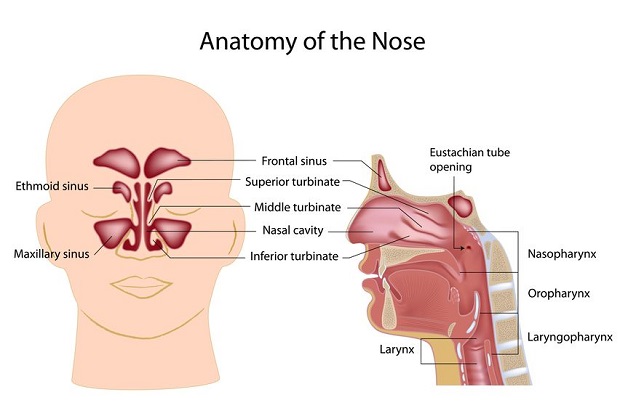
Can a Sinus Infection Cause a Sore Throat? A sinus infection produces a postnasal drip, which has the potential to cause a sore throat. A sore throat does not always accompany sinusitis, but it can be one symptom.
What Are the Sinuses?
The symptoms of sinusitis depend greatly on which sinuses are infected. There are four distinct sinus cavities in the skull. The maxillary sinus is the largest and is located in the cheekbone. The second-largest is the frontal sinus, which is located in the forehead above the bridge of the nose. The ethmoid and sphenoid sinuses are quite small compared to the other two and are located between the eyes. So severe pain emanating from the lower forehead would likely be due to a frontal sinus infection. ((WebMD – What Are the Sinuses?))

What Is a Sinus Infection?
The sinuses contain tissue lined with a mucous layer that helps defend against bacteria, germs, and viruses. A sinus infection will cause this tissue to become inflamed, causing various symptoms, including loss of smell, bad breath, headache, fatigue, fever, nasal stuffiness, postnasal drip, and sore throat. ((WebMD – Treating a Sore Throat Caused by Post Nasal Drip))
Post-Nasal Drip Can Cause a Sore Throat
Mucous is present in the nasal cavity to keep the nose and throat moist and drive away bacteria and impurities that may enter the nasal cavity. It generally runs down the back of the throat unnoticed. Sickness, such as a cold, the flu, or a sinus infection, can cause this naturally occurring mucus to build up and thicken, causing the post-nasal drip to become more noticeable. It can also cause a cough, sore throat, and difficulty swallowing. ((National Institutes of Health – National Library of Medicine – Sinusitis))
Is It a Sinus Infection or a Cold?
The primary indication that you are suffering from a bacterial sinus infection versus a cold is the duration of the symptoms. The symptoms of a simple cold will only last a few days and then dissipate, while bacterial sinus infection symptoms last for more than a week and may become more severe without treatment. Also, since a cold can precede a sinus infection, it is important to note the color of your nasal discharge. With a cold, nasal discharge is thin and clear; with a sinus infection, discharge is thick and yellow or greenish. ((Harvard Health Publishing – Harvard Medical School – Is That Winter Sniffle a Cold or a Sinus Infection?))





